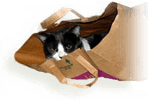By Diane Hirsch, Extension Educator Food Safety
A Good Idea, But Are They Safe?
 Is that reusable grocery bag really such a good idea? Many of us have finally been won over to the reusable grocery bag culture. But, as a food safety educator I have often wondered, how sanitary are these bags that are used over and over for many purposes that may not even be related to food. I was always pretty good about washing out the kid’s lunch boxes, but grocery bags? Not so much. Could it be possible that I could cross-contaminate perfectly safe food with my dirty bags?What’s Lurking In Your Reusable Bags?
Is that reusable grocery bag really such a good idea? Many of us have finally been won over to the reusable grocery bag culture. But, as a food safety educator I have often wondered, how sanitary are these bags that are used over and over for many purposes that may not even be related to food. I was always pretty good about washing out the kid’s lunch boxes, but grocery bags? Not so much. Could it be possible that I could cross-contaminate perfectly safe food with my dirty bags?What’s Lurking In Your Reusable Bags?
I myself have invested in quite a beautiful array of bags from supermarkets in my neighborhood; a Wegman’s bag from Syracuse where my daughter goes to college (I grew up in West Irondequoit, a suburb of Rochester where Wegman’s began as a single local grocery store in my home. How it has grown. And their bags are double wide! But I digress…) and bags from national chain stores like Trader Joe’s and Whole Foods. Some stores will give you a rebate or discount if you use reusables. And you don’t even need to use THEIR reusables.
But, as a food safety educator I have often wondered, how sanitary are these bags that are used over and over for many purposes that may not even be related to food. Could it be possible that I could cross-contaminate perfectly safe food with my dirty bags? I was always pretty good about washing out the kid’s lunch boxes, but grocery bags? Not so much.
- Just how sanitary are these bags?
Well, a study done recently in Canada has given me pause. The Canadian Environment and Plastics Industry commissioned a study to determine the presence of bacteria, yeasts and molds in reusable grocery carry bags. Skeptics or those concerned about bias in research may question the reliability of a study like this done by the plastics industry. And some may think that the sample is small. So keep this in mind.But, researchers noted that about 40 percent of the bags harbored molds and yeast that could trigger allergic reactions and infections. And nearly two-thirds of the bags were contaminated with some type of bacteria. Not all bacteria cause foodborne illness. And no E. coli O157:H7 or Salmonella were found in the study. Even if the study was not very rigorous, it did make me think that I had better change my reusable bag habits. So don’t freak out yet… - Should you toss those reusable bags and just use plastic?
Should you go back to using all those one-time use plastic bags or maybe even paper if available? Not necessarily. It would be smart to use a little common sense. - Why do you need to pay attention…..but not necessarily freak out? Certain foods such as raw meat, poultry and fish can be carriers of the bacteria, viruses and parasites that cause foodborne illness. Fresh produce, too, may carry certain bacteria or other foodborne illness causing organisms. In an effort to use less plastic, you may put meats and fresh lettuce into your bag without using the additional protection offered by the rolls of plastic storage bags at the end of the produce aisle or meat case. This would contribute to the potential of cross-contamination. Bags can pick up the bacteria from the foods you put in them, the grocery cart, the floor you set them on, the station wagon where the dog sits, etc.
- What can you do to make things better?
Again, do not panic and go back to plastic. There are some simple steps you can take. And it is likely that you wash out lunch boxes. This is not much different. Here are some tips for lowering the risk of cross-contamination by grocery bag:- Wash those bags!
Wash your grocery bags when they get dirty – especially if there is evidence of milk, meat or poultry juices, or decayed veggies in the bag. Certainly it would be best to accomplish this in the washer with hot water and laundry detergent. But some bags are not machine washable — so turn them inside out and wash them in the sink. Let them air dry. And next time you invest in a new bag, try to find bags that are machine washable. - Keep them separated!
Try to designate one bag for fresh produce, another for raw meat, poultry or fish. If possible, use a different color for different foods (and try to remember which is which) or use a permanent marker and label each bag. Also, place raw foods in the plastic bags that are found in the produce or meat section of the store before you place them in your bags. - They’re just for groceries!
Use the grocery bags for groceries only. Designate another set of bags for other uses. If you can’t do this, then wash them before using for groceries. - Shop and clean up!
After emptying your bags at home, wash off the table or counter surface where the bags were sitting. - High and dry!
Before folding bags and storing them, be sure to let them air out and dry.
- Wash those bags!
These hints are especially important if you have very young children or folks with compromised immune systems such as the elderly or chronically ill in your home.